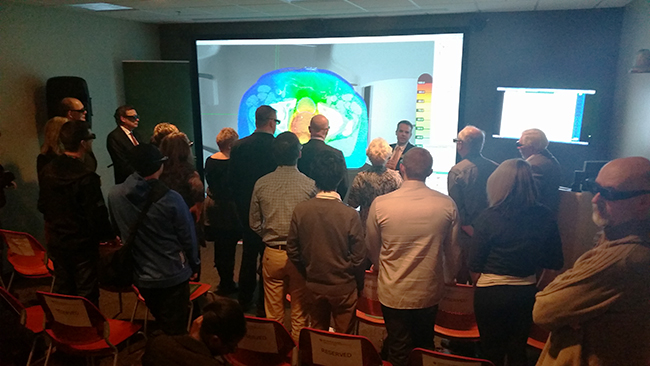
The Radiation Therapy program's virtual simulation technology is demonstrated for dignitaries.
(Edmonton) Britny Martens has been in exclusive company before, but never quite like this.
Martens is one of five students in the inaugural class of the University of Alberta's new Radiation Therapy program. The degree program, within the Faculty of Medicine & Dentistry's Department of Oncology, welcomed its first students fall 2014.
Since she was a child, Martens dreamed about one day working in health care and was convinced radiation therapy was an ideal career for her after learning of the impact practitioners have on cancer patients.
"I know what it's like to live with somebody with a chronic illness and the strain it puts on your family and that person. So when I found out about radiation therapy, I was really interested in the connection they make with their patients," she says.
The new program has bloomed into existence in just a few short years. After a program's proposal was first submitted to government in 2011, official approval for the Radiation Therapy program came in 2012, along with funding from the Ministry of Innovation and Advanced Education. After a flurry of planning, recruitments and renovations, the program opened its doors to students in the fall of 2014.
Richard Fedorak, dean of the Faculty of Medicine & Dentistry, says it's an important step forward for cancer care in Alberta. "Through this unique program our graduates will benefit from the most comprehensive training available today. The excellence of this program will lead to excellence among our students who will go on to become confident, compassionate health professionals - who are among the very best in the world at what they do."
"I believe it is the most innovative new program the university has established in a long time," adds Sandy McEwan, chair of the Department of Oncology. "To actually go from the drawing board to opening a new program in two years is unique in the annals of the university and an extraordinary achievement by the group we've put in place.
"We believe this new program is important because of the complexity of our understanding of cancer and its treatment."
While only five students are enrolled for the 2014-2015 academic year, yearly enrolment will soon be increased to 15 students, with a potential maximum capacity of 25. The increase will help meet demand for highly trained radiation therapists brought on by the recent opening of cancer treatment units in Lethbridge and Red Deer along with another unit soon to be opened in Grande Prairie.
Demand is also expected to grow, with the expected retirement of almost half of Alberta's current radiation therapists within the next decade.
Susan Fawcett, director of the Radiation Therapy program, says the U of A-trained clinicians will help fill a need. "If we look at literature, it suggests that about 50 per cent of patients that develop cancer should access radiation therapy at some point in their treatment. Alberta's numbers are nowhere near that."
Fawcett says a higher level of training among radiation therapists will result in better patient care. As part of the program, the university has purchased a functioning linear accelerator for student training purposes. It will compliment a virtual simulator of the same equipment, both of which will help ease students into clinical practice.
The future of the radiation therapy program could also soon see it offer a master's program within three to five years, along with upgrade and continuous learning courses for practitioners.
While Britny Martens still has years of schooling left before she becomes a radiation therapist, she's excited for the future. Already she can picture herself in it, a health professional with both the expertise and empathy necessary to help patients in need.
"Radiation therapists can see patients up to 30 times and are going through the experience with them on their journey through cancer," says Martens. "I just want to be in a position where I can provide some hope and some support. This program, this job, it's really all about that."